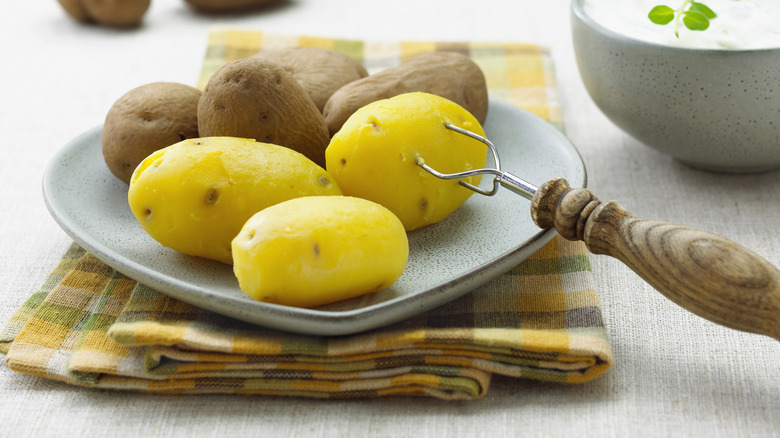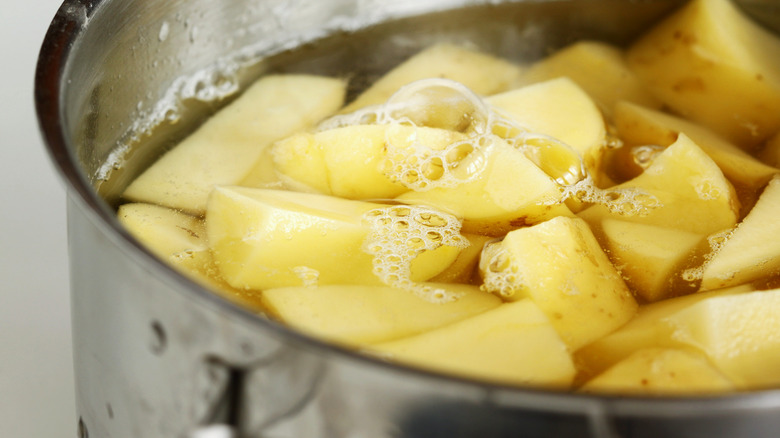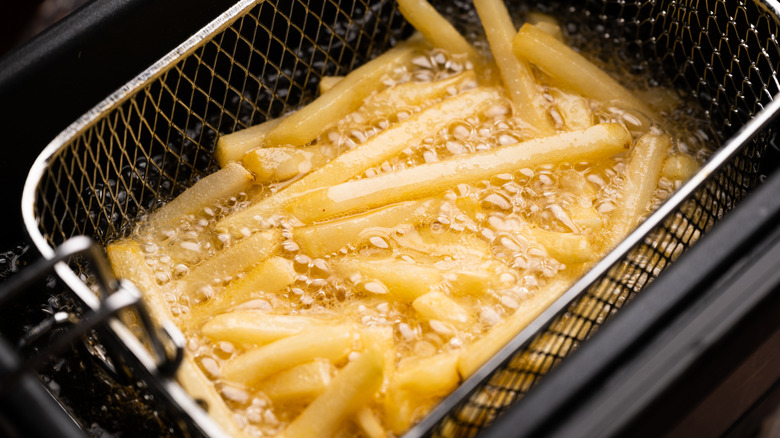Why Vinegar Could Stop Your Potatoes From Softening
You never want to bite into a piece of potato only to be met with a crunch akin to an apple. You can't exactly make mashed potatoes when the spuds themselves aren't soft either. But whether it be baked or boiled, if a potato is still hard, it usually means it's undercooked. More time on the stove or in the oven may be the most obvious solution, but if your potatoes are still refusing to soften, it's likely something else that's to blame.
Boss the Kitchen points out that potatoes can actually harden if they're extremely overcooked. This is usually evident in the state of the skin, which will turn tough and chewy. It could also be the type of potato that's the culprit, the Idaho Potato Commission suggests. Very cold weather can sometimes disrupt the growth of medium starch potato varieties, causing them to have a very dense consistency that is difficult to fully soften. What's more likely, however, is that you used vinegar in your recipe.
Acid prevents potatoes from softening
Acid is an important component in any recipe, but if you're working with potatoes, it's best to add it after it's cooked, if at all. That includes not just vinegar, but also lemon juice and tomatoes, according to Harold McGee, author of "On Food and Cooking: The Science and Lore of the Kitchen" (via Bon Appétit). Hemicellulose, the carbohydrate that makes up potatoes, softens when cooked, but when you add an acid like vinegar, the hemicellulose will remain solid instead. Even when the acidic element is diluted in the boiling water, the potato won't fully soften, McGee explained to the outlet.
For softer potatoes, knix the vinegar and cook your potatoes in salted water instead. Salt does the opposite of acid in potatoes, Baking Kneads shares. Instead of preventing the hemicellulose from softening, salt breaks down the starch and pectin, resulting in much fluffier potatoes than you'd ever get out of using vinegar.
There's an exception for cooking potatoes with vinegar
Because vinegar prevents potatoes from fully softening, recipes where you want the potato to be crispy on the outside but soft on the inside actually benefit from the addition of acid. Celebrity chef Alex Guarnaschelli shared with Food Network that the fries served at her restaurant, Butter Restaurant, are actually blanched in a mixture of boiling water and vinegar, and she uses the same method for her potato chips. Guarnaschelli revealed that she learned the tip from J. Kenji Lopez-Alt, who originally wrote about it in Serious Eats.
As Lopez-Alt explained in his article, vinegar leaving the potatoes partially firm makes them the perfect texture for frying. Instead of falling apart, the fries hold their shape. Since there isn't enough vinegar to penetrate the interior of the potato, the fries remain soft and fluffy on the inside while the outside crisps up. Lopez-Alt uses only two tablespoons of white vinegar per two quarts of boiling water. If you're not making fries, however, just stick to plain water with a dash of salt.


